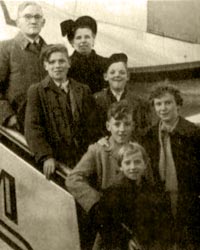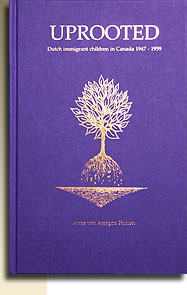


 |
|||
 |
|||
 |
 |
||
|---|---|---|---|
Of her twelve children, six emigrated during the early 1950's. The ones that left had the larger families, for whom a future in Holland was problematic. In consequence, Opoe lost two-thirds of her grandchildren in a short period of time. This was a permanent goodbye; she knew it was forever. I have been told that she never recovered from this blow. She died six years later of cancer.
Not only did our grandparents lose their grandchildren to emigration; we lost our grandparents overnight when our parents took us to Canada. Is it because of this that I have informally adopted old people all my adult life? Was it a subconscious hunger for my missing Opoe that made me look around for an older person who would accept me with love and understanding? Many immigrant children dealt with the same loss. Jean VanderKwaak was eleven-year-old Jikke Strikwerda when she said goodbye to her grandparents in 1947.
"It didn't mean much then," she says. "Now I can cry about it. I left my grandparents behind and never really dealt with that."
Erna Fex says she was "devastated and frightened."
"Very dramatic" is how Dina Veenbaas described her departure. "Tears, prayers, and a lot of emotion."
John Nykamp remembers the goodbye as being "extremely emotional, lots of tears, fearful of never seeing [my grandmother] again."
Nicole van Gils was nine when her parents decided to leave the country. On the day of departure, she recalls, "I hid in my grandmother's garden and made myself small so I wouldn't have to go. I was found, of course, and I have this feeling I was crying and sobbing and shrieking - I remember this feeling of death – something had died and would never be the same or come back. I still can't look at a dahlia without this poignant feeling coming over me."
Elly Hoftyzer was nine when her very large family prepared to leave for Canada. She recalls them renting a car and chauffeur to take them around the various relatives for a final goodbye. She and a brother were privileged to come along, a major treat since riding in a car was a total novelty to them.
"One person we visited was Oma Karssenberg," relates Elly. "I will never forget the pain, the crying, the agony. It still brings pain and tears when I think of it. Mother was inconsolable. Dad was so gentle and kind, and for that reason it was worthwhile to go along." The sad farewell stuck in Elly's memory particularly because, as she says, "emotions were generally kept in check."
Maria Smedes remembers her grandmother crying uncontrollably. For a nine-year-old this was hard to take. But the only thing Nel De Groot recalls is "falling out of a train on our last visit to them."
Anthony Strijbosch, who came at age thirteen as the youngest of a sibling group, says "saying goodbye is something we did not look forward to. We had many friends and relatives and saying goodbye in 1951 felt like saying goodbye forever. We decided among ourselves to put up a good show, act strong and courageous. Our family was also a singing family and we decided that as we entered the bus at our local grocery store that would take us to the airport that we would sing the song Vaarwel mijn dierbaar Vaderland– farewell, my beloved fatherland.
"Whenever I think of this goodbye it brings out deep emotions. It feels as if something was lost forever; coming into the new land felt as if something was gained forever. The change at that time was dramatic."
John Eekhof remembers "this old woman in a bed in the wall, recessed; dressed in black. She was dying." The woman in the bedstee was his father's stepmother, John's only surviving grandparent at the time his family made a goodbye tour of all the relatives.